Marking 50 Years of Apartheid in Pakistan
I would be arrested for writing this article in Pakistan, and that's exactly why it must be written
This is not a story you’ll read about in much of legacy media, but it is a critical story that impacts countless people globally. This is also a deeply personal article because it addresses my birth nation, Pakistan, and my faith as a Muslim who belongs to the Ahmadiyya Muslim Community. This is not an article about evangelism, but about universal freedom of conscience—or the lack thereof.
While founded as a nation committed to religious freedom and pluralism, Pakistan betrayed its founding principles 50 years ago on September 7, 1974. On that day, Pakistan enacted religious apartheid against the Ahmadiyya Muslim Community. This horrid decision has since metastasized as a cancer that has suffocated Pakistan’s growth, potential, and once promising future.
Let’s Address This.
A brief history of the Ahmadiyya Muslim Community
Founded by a man named Mirza Ghulam Ahmad in 1889 in a small village known as Qadian, in India, the Ahmadiyya Muslim Community now spans more than 200 nations globally with tens of millions of adherents. It is the oldest organized Muslim community in the United States, establishing the first and longest running mosque, Al Sadiq mosque, on the south side of Chicago in 1921. This historic mosque raged against Jim Crow America and invited Black, Latino, Indigenous, and white Americans to worship and break bread together, even performing interracial marriages—which were criminal at the time.
Pakistan’s first foreign minister, Sir Muhammad Zafrullah Khan, was an Ahmadi Muslim. He was also a champion of Palestinian rights. He has tragically been erased from Pakistan’s history books.
Pakistan’s first Nobel Laureate was renowned physicist Dr. Abdus Salam, an Ahmadi Muslim. He has likewise been all but erased from Pakistan’s memory.
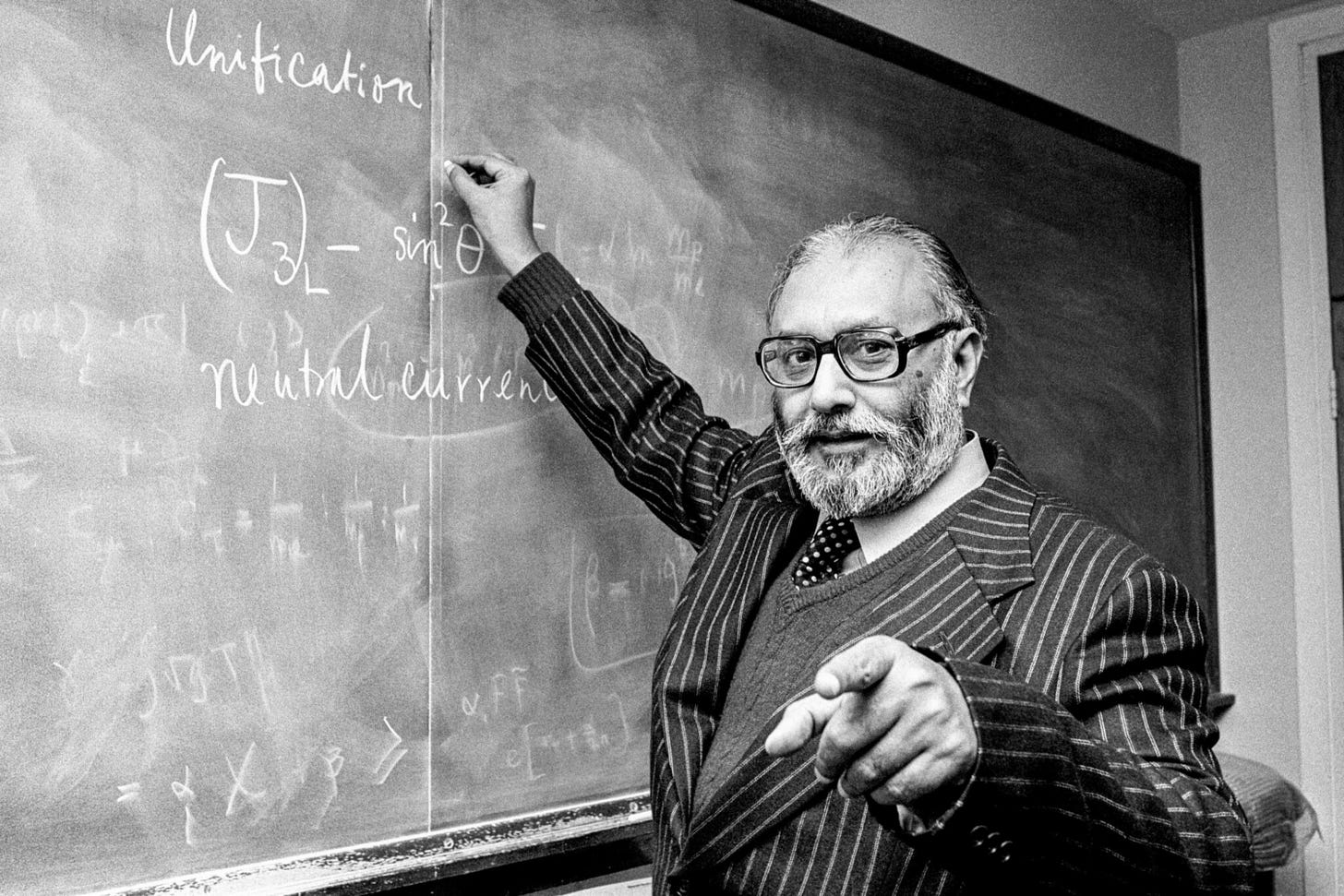
Ahmadi Muslims in Pakistan are expected to disappear, and I do not say that as a figure of speech. After his death and burial, the Pakistani government desecrated Dr. Salam’s grace because it dared to identify Dr. Salam as a Muslim.
By any objective measure, Ahmadi Muslims are peaceful, law abiding citizens in Pakistan and indeed in every country in which they reside. So what went wrong? Due to nothing more than private theological differences, right wing extremists launched a full scale and violent hate campaign against Ahmadi Muslims. Unwilling and unable to meet Ahmadi Muslims in the field of intellectual debate, ignorant clerics globally have turned to punitive punishments to silence dialogue and kill those who dare speak up.
The persecution becomes state sanctioned

Ahmadi Muslims have long suffered hate and bigotry from hardline extremists who insist on enacting violence and terrorism. But this violence elevated to a new level in Pakistan on September 7, 2024. This date marks fifty years of apartheid in Pakistan. On September 7, 1974, Pakistan passed the Second Amendment to its Constitution, which declared the Ahmadiyya Muslim Community as “non-Muslim” under the law. You might be wondering what right a government has to dictate a person’s personal faith? The answer is, no government has this right, and this is why we must ensure religion state separation. Pakistan’s Founder Muhammad Ali Jinnah declared:
You are free; you are free to go to your temples, you are free to go to your mosques or to any other place of worship in this State of Pakistan. You may belong to any religion or caste or creed. That has nothing to do with the business of the State.
Sadly, the Government of Pakistan violated this sacred principle, which was at the core of Pakistan’s founding. Worse yet, this persecution has since spread to other nations as well. Pakistan’s Second Amendment represents a grotesque violation of Pakistan’s own Constitution, including Article 20, which protects the right of every citizen to profess, practice and propagate their religion, and its founding promise of universal religious freedom. It furthermore violates the International Covenant on Civil and Political Rights (“ICCPR”), which Pakistan has ratified. This Amendment enabled more aggressive and violent discrimination against Ahmadi Muslims—which soon followed as punitive law.
Building on the Second Amendment, on April 26, 1984, Pakistan’s Dictator General Zia-ul-Haq issued Ordinance XX, adding sections 298-B and 298-C to the Pakistan Penal Code. These sections made it a crime for Ahmadis to self-identify as Muslims or practice their faith, imposing severe penalties, including fine, imprisonment, and capital punishment. These provisions also ban Ahmadi Muslims from voting, holding office, performing the Hajj pilgrimage, printing or distributing any religious literature, holding public assembly, or being buried in Muslim cemeteries.
Over the years this apartheid has resulted in horrific violence perpetrated against Ahmadi Muslims, only for their faith. This includes mass murdering 93 Ahmadi Muslims during worship services in their mosques in Lahore, burning villages and killing Ahmadi women and children in the process, and destroying and desecrating countless cemeteries and mosques built by the Ahmadiyya Muslim Community.
And lest anyone assume this violence is in response to any action taken by Ahmadi Muslims, it is categorically one sided. Throughout the Ahmadiyya Muslim Community’s history dating back to 1889, no example exists of an Ahmadi Muslim committing religious violence, or endorsing religious violence. Ahmadi Muslims believe Islam can never endorse aggressive violence, terrorism, or theocracy. Instead, Islam mandates universal religious freedom, service to all humanity without discrimination, and separation of religion and state.
As a result of this overwhelming discriminatory legislation, Ahmadi Muslims in Pakistan live under a system of apartheid. Thousands of Ahmadi Muslims have been charged, arrested and imprisoned under the anti-Ahmadi and blasphemy laws; police routinely destroy Ahmadi Muslim mosques and desecrate the community’s gravestones; clerics and politicians alike hurl abuse at and incite violence toward Ahmadi Muslims; and consequently terrorists have murdered hundreds of Ahmadi Muslims with impunity. Even now, Pakistan is erupting in celebrations marking half a century of apartheid against Ahmadi Muslims.
Human rights groups condemn the persecution
Numerous human rights organizations including Amnesty International, Humanity First, and the US Commission on International Religious Freedom have loudly condemned this state sanctioned persecution against Ahmadi Muslims. In 2021 the UN Office of the High Commissioner for Human Rights (“OHCHR”) issued a detailed report on the systemic state sanctioned persecution of Ahmadi Muslims in Pakistan and numerous other countries. The report provides at least eight urgent recommendations to counter these injustices. In part, the OHCHR report observes:
Of particular concern are the constitutional provisions, special ordinances, ministerial decrees, or religious edicts that stigmatize and discriminate against the Ahmadiyya community in countries such as Indonesia and Pakistan, and which prohibit Ahmadis from identifying themselves as Muslims, freely expressing their beliefs, practicing their faith, and from effectively participating in public life. Ahmadis are often denied access to public-service employment on religious grounds and are particularly vulnerable to violations under laws on offences relating to religion (blasphemy laws). They are also targeted by laws regulating new technologies and social media platforms, with the aim to suppress their dissenting views and beliefs, enhance control of their minority communities and further increase their persecution through coordinated online hate campaigns and, in certain cases, online coordinated acts of collective punishment.
Furthermore, we note with grave concern the application of discriminatory regulations that appear to aim at denying Ahmadis’ fundamental freedoms as citizens, including inter alia their voting rights and their access to identification documents, as well as imposing administrative obstacles in the enjoyment of their right to form and maintain associations.
Yet despite these efforts, the violent persecution of Ahmadi Muslims persists. Indeed, even when yours truly ran for US Congress here in the United States, intolerant clerics issued edicts condemning me for my faith as an Ahmadi Muslim—even going as far as to threaten the broader Muslim community with excommunication for supporting my candidacy. Fortunately, a number of thoughtful, compassion, and sincere members of the broader Muslim community were vociferous in their support of my candidacy, and rejection of the religious hatred hurled against me. I am grateful to those thoughtful neighbors, and I am likewise hopeful that more such thoughtful and compassionate people reject religious bigotry and embrace service to humanity.
In conclusion
Today the Ahmadiyya Muslim Community is at the forefront of global humanitarian aid. From supporting critical medical and food aid in Gaza, to feeding Ukrainian refugees, to combatting the Rohingya genocide, to building hundreds of free schools and hospitals globally to serve all humanity indiscriminately—Ahmadi Muslims continue to exemplify their faith globally through relentless efforts of no strings attached service to all humanity. And despite the persecution, the community continues to grow.
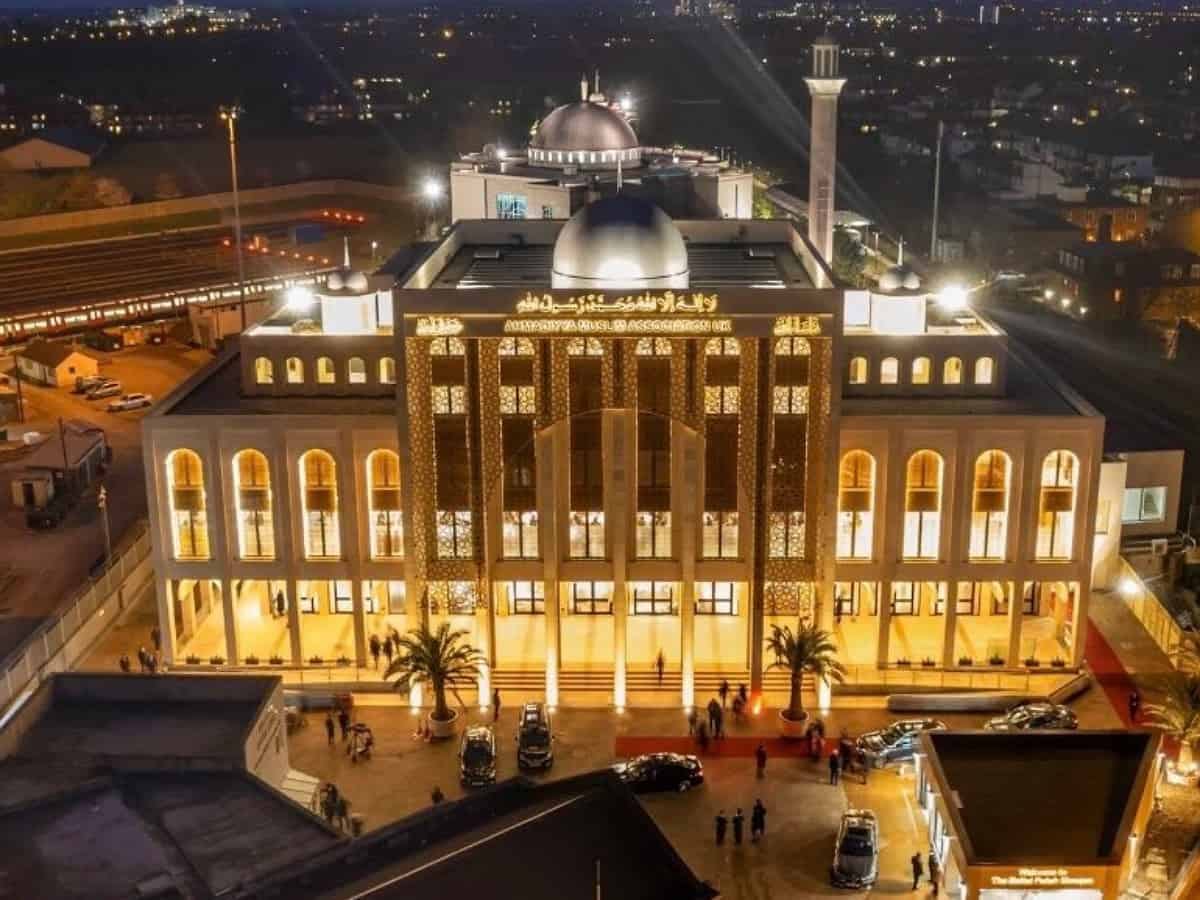
The bottom line is this. Ahmadi Muslims in Pakistan are peaceful law abiding citizens. Ahmadi Muslims in Pakistan should be entitled to the same rights and privilege as all citizens of Pakistan according to Pakistan’s Constitution. They should be entitled to those same rights and privileges as all citizens of Pakistan according to the ICCPR, which Pakistan has ratified.
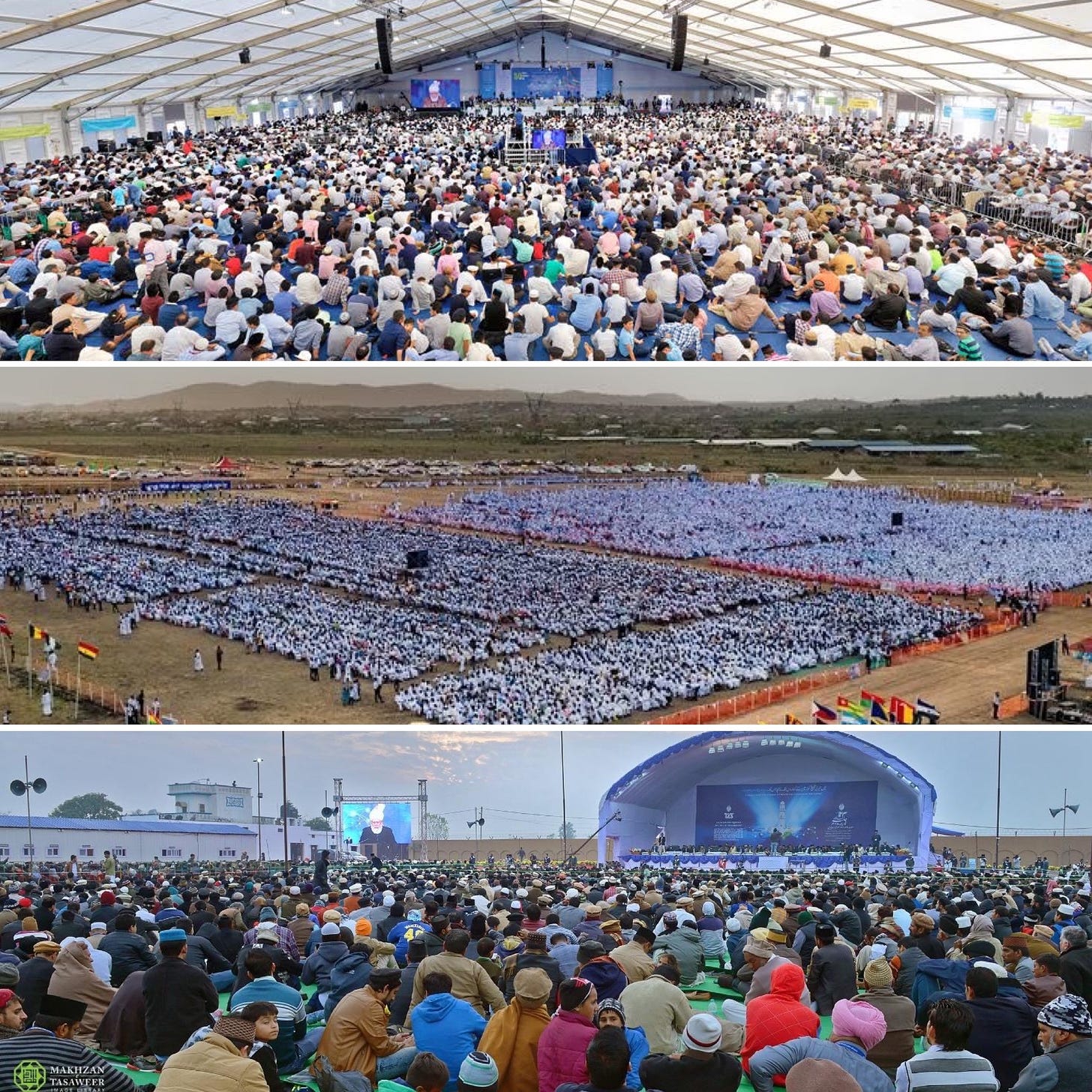
Instead, Ahmadi Muslims are denied those fundamental rights, and tragically suffer state sanctioned persecution via Pakistan’s Second Amendment and unlawful denial of their faith identity. We must stand united, people of all faiths and no faith, backgrounds, ethnicities, nationalities, and diversity, on the principle that justice, human rights, and freedom of conscience must supersede all differences of faith,
The Government of Pakistan must uphold its obligations under its own Constitution, under the ICCPR, and according to its own founding principles, and immediately and urgently repeal the Second Amendment to Pakistan’s Constitution.
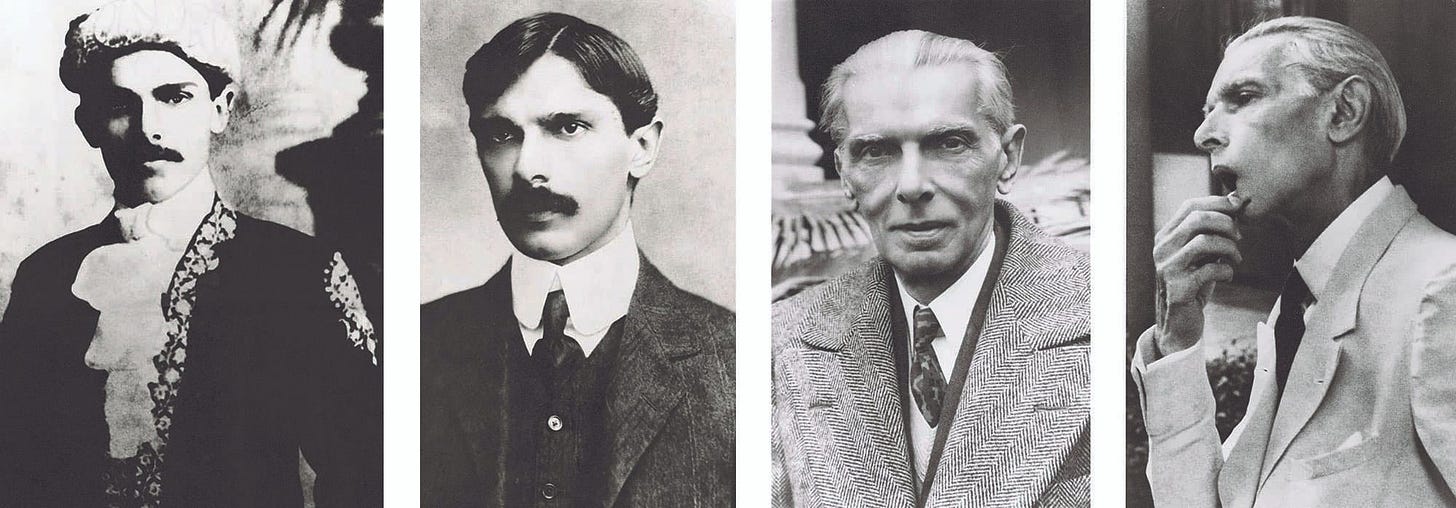
Fifty years of apartheid and Pakistan’s decline are enough. It is time to meet the founding promise of Pakistan with sincerity, as Pakistan’s Founder Muhammad Ali Jinnah envisioned. In an address to the United States less than a year after Pakistan’s creation, Jinnah declared and reaffirmed Pakistan’s commitment to freedom and pluralism:
In any case Pakistan is not going to be a theocratic State to be ruled by priests with a divine mission. We have many non-Muslims — Hindus, Christians, and Parsis — but they are all Pakistanis. They will enjoy the same rights and privileges as any other citizens and will play their rightful part in the affairs of Pakistan.
For those interested in reading a more comprehensive analysis of the persecution Ahmadi Muslims face, here’s a link to download my peer reviewed law review article on the subject. To reiterate, I am not being hyperbolic when I state that I would be arrested for writing this article in Pakistan. Just last year an Ahmadi lawyer in Pakistan was arrested for having “Syed” in his name, and thus ‘illegally posing as a Muslim.’ And precisely because this article would be criminally banned in Pakistan, it is that much more important that we who are privileged enough to enjoy free speech, use it for those who cannot. We do not end apartheid by ignoring it, but by facing it head on and dismantling it with facts and truth—educating one thoughtful person at a time. Thank you for helping spread the word for the cause of justice and humanity.
Why Your Support Matters: Every dollar we spend is a vote for the kind of future we want. Help me create a future more committed to justice and universal human rights. Subscribe, and I welcome your thoughts, feedback, and insights. Thank you.

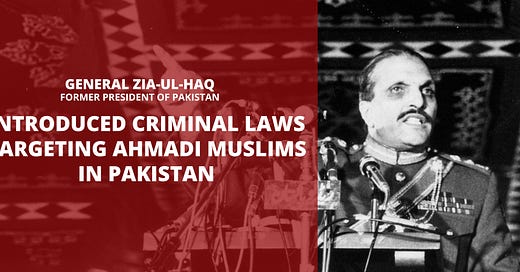


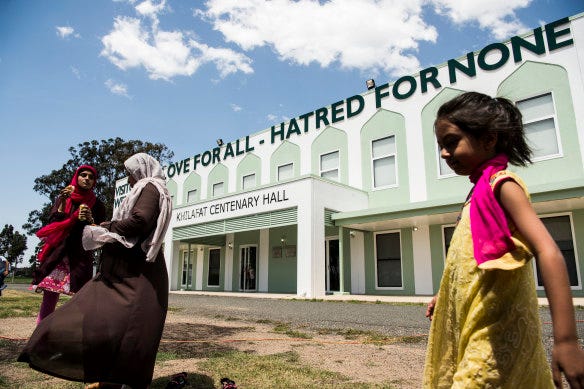

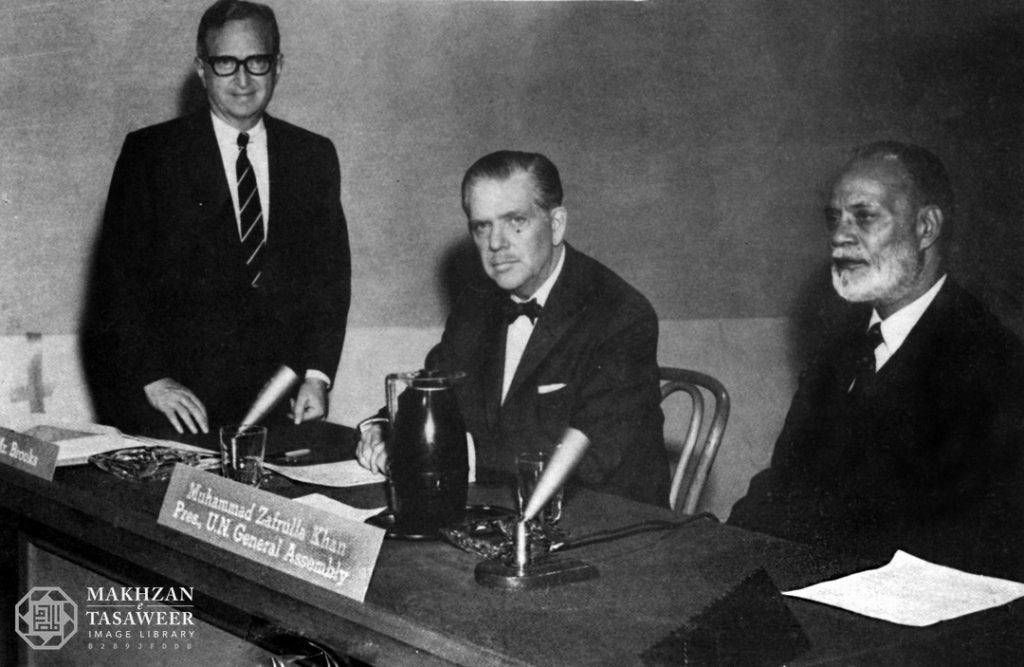
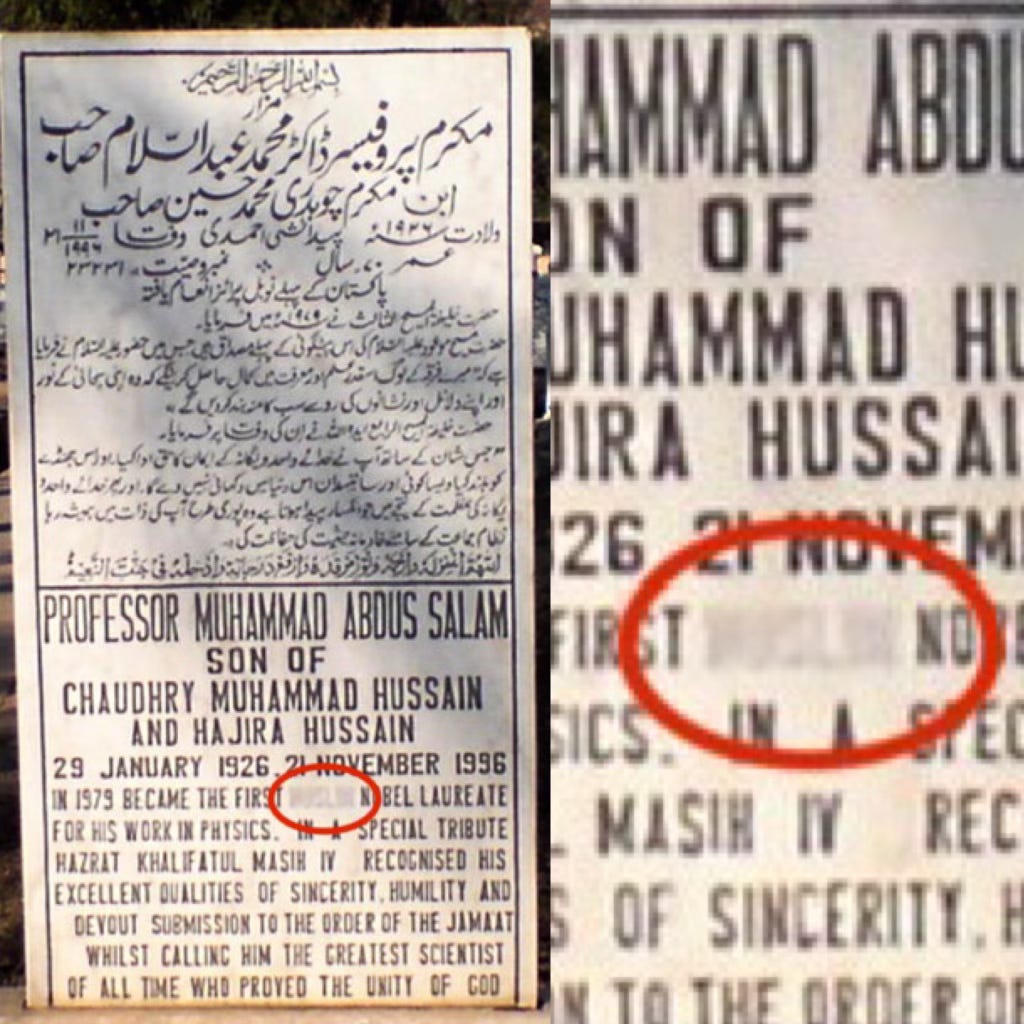

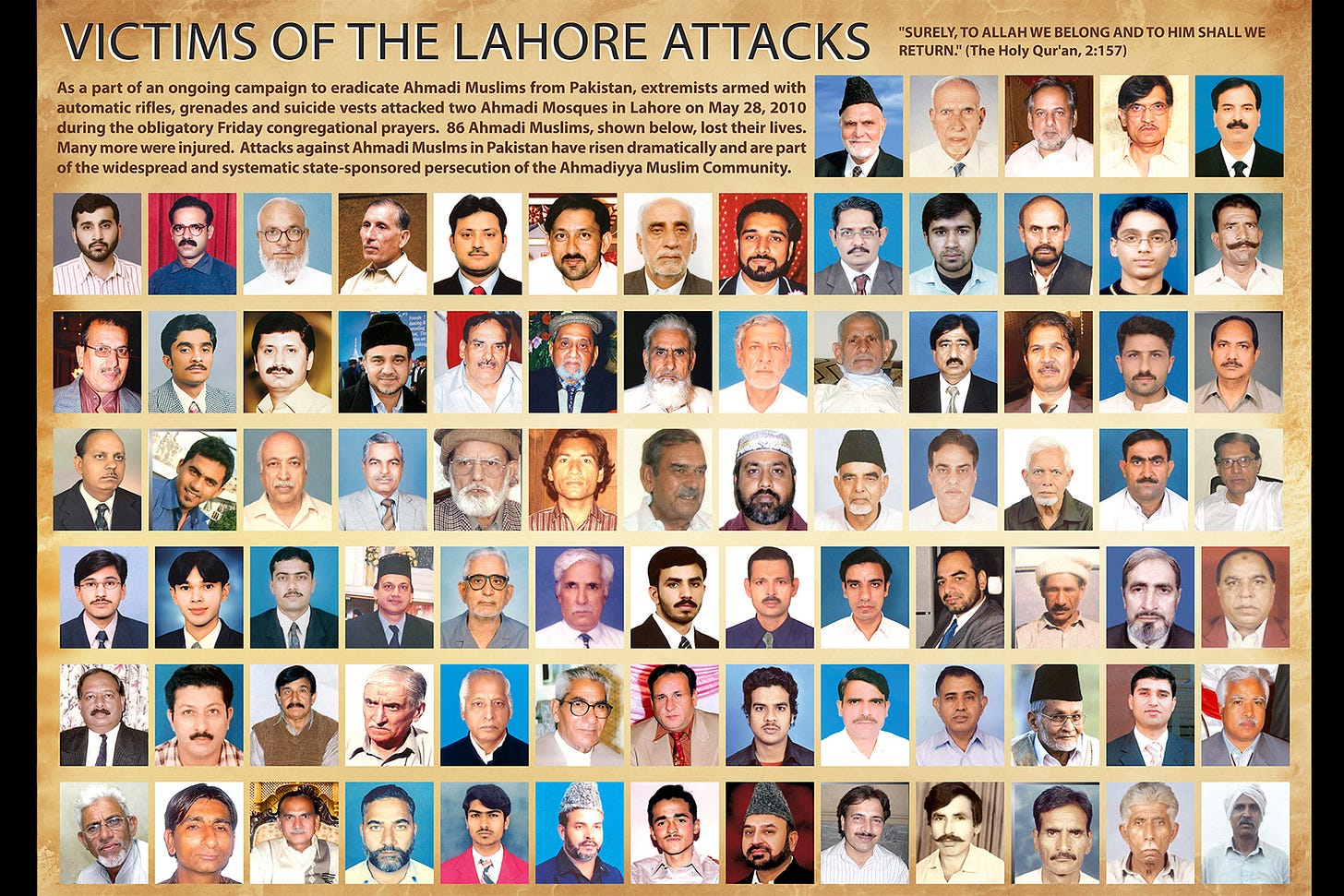
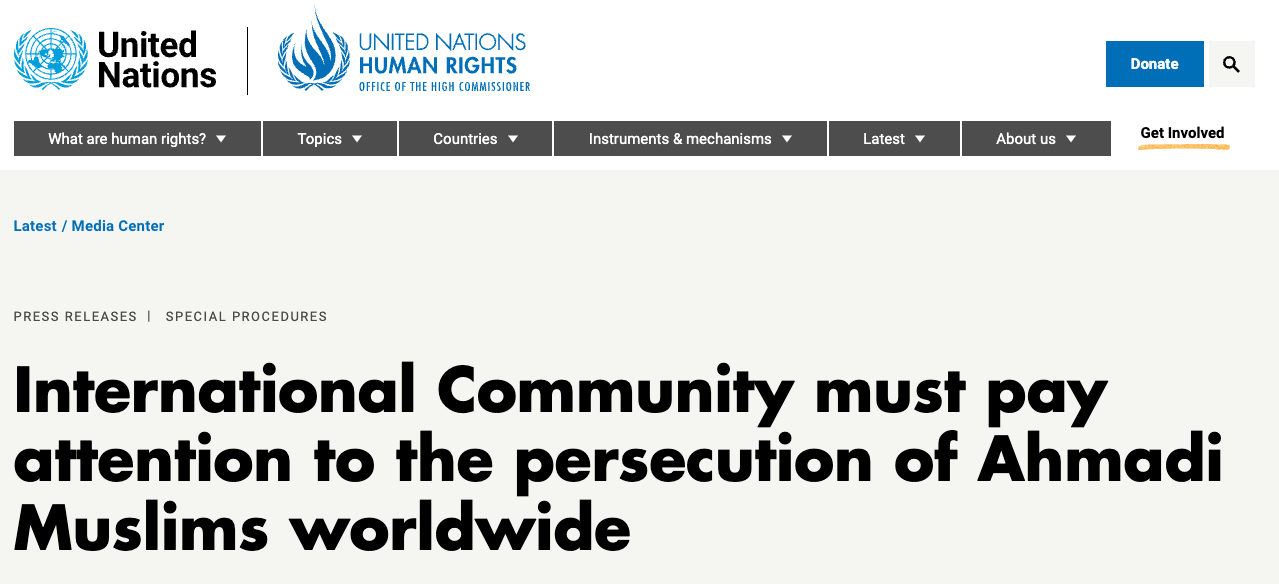
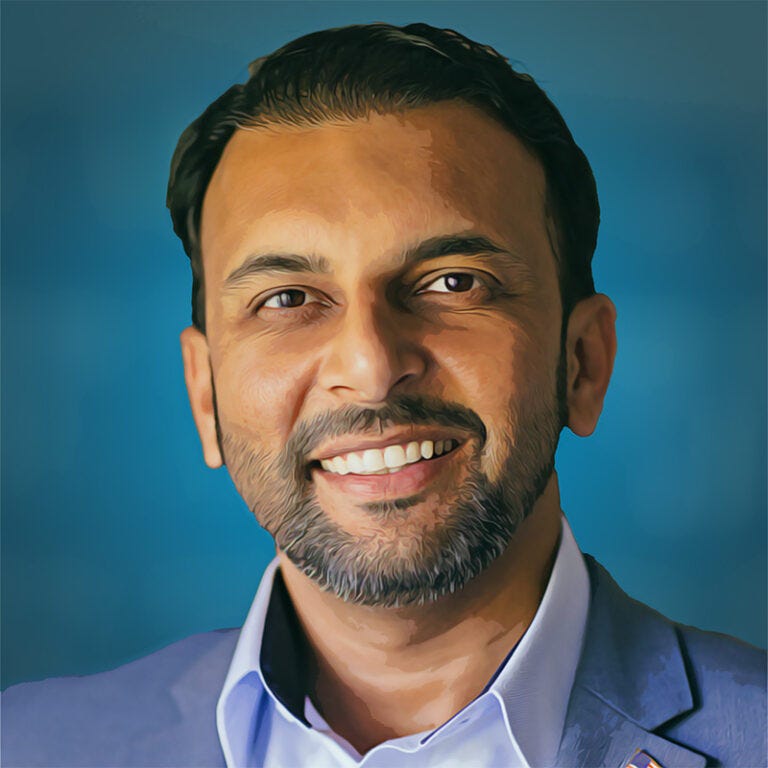
You wrote, "You might be wondering what right a government has to dictate a person’s personal faith? The answer is, no government has this right, and this is why we must ensure religion state separation"
So the parallels to our country with Christian nationalism in our government could not be clearer. Thank you for sharing this history with your readers.
Thank you for explaining this. Very helpful to know,and so sad indeed. Being informed is key